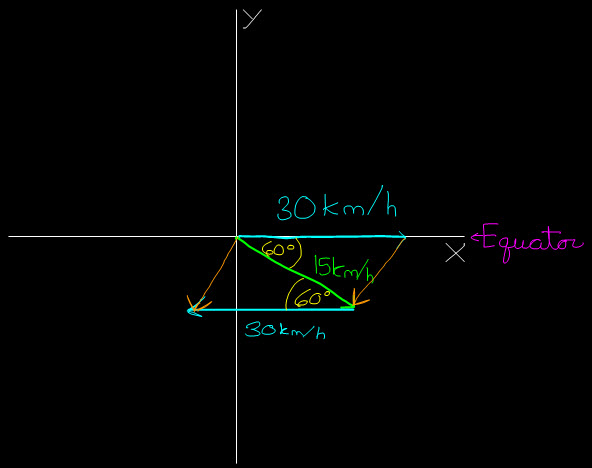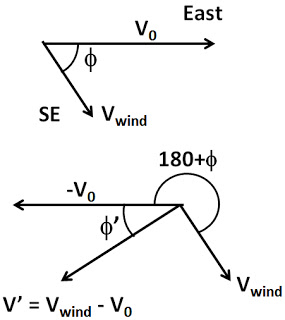I am having trouble understanding the reasoning behind the solution in this Irodov General Physics problem:
problem 1.6.) A ship moves along the equator to the east with velocity $v_0=30\;km/h$. The southeastern wind blows at an angle $\theta=60°$ to the equator with velocity $v=15\;km/h$. Find the wind velocity $v'$ relative to the ship and the angle $\theta'$ between the equator and the wind direction in the reference frame fixed to the ship.
My calculations:

After drawing the initial diagram I consider that in order for the wind direction to be relative to the boat, I need to subtract the boat vector from the wind vector.
In my diagram I have repositioned the boat vector to be subtracted from the wind vector and using trigonometry I solve as follows:
First the cosine law to determine the magnitude
The magnitude = $\sqrt{30^2 + 15^2 - 2\cdot 15\cdot 30\cdot \cos{60}}$
= $\sqrt{675} \approx 25.98$
Then for the angle I can use sine law
$\frac{sin(\theta)}{30\frac {km}{h}} = \frac{sin(60)}{\sqrt{675}}$
$\theta= \arcsin{\frac{30\frac {km}{h}\cdot sin(60)}{\sqrt{675}}}$
$\theta = 90°$
The answer I get is therefore that the wind, in reference to the boat (as felt by the people standing on the boat), is approx $26\:km/h$ at an angle of $60°$ South of West (in relation to the equator).
However the answer given in the solutions is always that the approximate speed of the wind is $40\:km/h$ and the angle is approx $19°$.
I have looked at the solutions and I think the best explanation is given in the following diagrams obtained from link #3:


I do not understand, however, why he is using $\cos{(\pi +\theta)}$. I want to understand why my solution is incorrect and yields a different answer. What is my mistake and what is the proper intuition for understanding this problem if I have done so incorrectly?
Solutions I have viewed:
